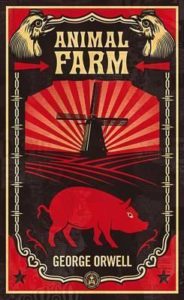
George Orwell’s Animal Farm was published 75 years ago today. It is one of the greatest allegories ever written — and one of the most familiar.
Or is it?
Most of us understand the broad symbolism of the story. The animals seizing their farm from Jones the farmer are the people of Russia rising up against the ruling class. On Animal Farm, as in the Soviet Union, a new ruling class then takes control. These are the pigs (the Communist elite) who unleash the dogs (the secret police) to enforce their will. Most of the other animals — especially the horses, the cattle and the sheep — represent the people, who find themselves exploited, lied to and terrorised by their new masters.
By the end of the story, the rule of the pigs is as oppressive as the rule of man ever was. Furthermore the pigs are doing deals with the humans (capitalists) who still run the neighbouring farms (countries). The final line is devastating:
“The creatures outside looked from pig to man, and from man to pig, and from pig to man again; but already it was impossible to say which was which.”
However, there are other animals on Animal Farm who don’t fit within the class structure outlined above. As such they expose the flaws in the Soviet Communism that Orwell abhorred, but also of the democratic socialism that he did believe in.
One of the most obvious of the misfits is Moses the raven, who symbolises religion in general and the Russian Orthodox Church in particular. He is a pet of the Joneses, a “clever talker” who tells “lies” about “Sugarcandy Mountain” — the heaven that good animals go to when they die. Orwell isn’t satirising Marx’s ‘opium of the people’ line here, but agreeing with it. Indeed, come the revolution, he has Moses simply flap-off; there’s no allegory of the savage persecution that the Soviets inflicted on the faithful. Moses reappears much later in the story, a reference to Stalin restoring some freedom of worship as a morale-boosting measure during the Second World War. But, for Orwell, this is just another betrayal of socialism, not an opportunity to explore its spiritual emptiness.
While we’re on the subject of birds, it’s worth mentioning the hens, ducks and geese of Animal Farm. If the hoofed animals (certainly the horses) represent the urban industrial workers, then the winged creatures (certainly the hens) represent the peasantry. Socialists have always had a problem with countryfolk and vice versa. There’s something resolutely un-progressive about a scratching a living from the earth, but it’s also threatening — given the dependency of the city on the countryside for its sustenance. In the story, the hens have their eggs expropriated by the pigs and, when they protest, they have their rations cut: a somewhat underpowered metaphor for the murder of millions by famine-genocide.
The rats, rabbits and other wild creatures of Animal Farm represent the ‘lowest’ group of misfits. Though unquestionably downtrodden, they’re also deemed unproductive and thus don’t count as either workers or even peasants. What place is there for them in a Communist — sorry, Animalist — society? Early on, the animals have a vote on whether “rats are comrades”. Generously, most vote in favour, but the question is never really resolved.
Nor is the question as to who exactly Orwell meant by the farm’s feral creatures. However, in the Road to Wigan Pier he likens a “common lodging house” to a “sewer full of rats”. Clearly, he wrestled with own prejudices, especially against the common people at their poorest and most chaotic. It’s a reminder that for many intellectuals of the age, socialism was as much about taming the masses as setting them free.
I’d love to say something about Benjamin the donkey and Muriel the goat, but I’m running out of space. So I’ll conclude with a beast that’s given no name — the cat. She’s the most mysterious of all Orwell’s animals. Many interpretations have been placed upon her — for instance, that she represents espionage, criminality, prostitution or the idle bourgeoisie. But, whether intended by the author or not, I think she represents independence of spirit and practical self-sufficiency.
Orwell saw the middle-class (especially the upper-middle-class to which he belonged) as a useless relic of a bygone age — one that “should sink without further struggles into the working class where we belong.” He failed to see that a rising section of the working class had every intention of moving, by its own efforts, in the other direction.
While the cat of Animal Farm is portrayed as aloof, duplicitous and parasitical, the reality is that cats have not only made a vital contribution to human agriculture by controlling vermin, but have also done so on their own initiative. Alone of all God’s creatures, they tamed themselves.
These most extraordinary of animals stand as symbols of the most extraordinary human beings: the pioneers, self-starters, entrepreneurs and innovators on whom progress actually depends.










Join the discussion
Join like minded readers that support our journalism by becoming a paid subscriber
To join the discussion in the comments, become a paid subscriber.
Join like minded readers that support our journalism, read unlimited articles and enjoy other subscriber-only benefits.
Subscribe